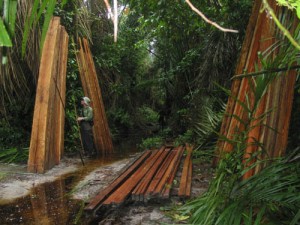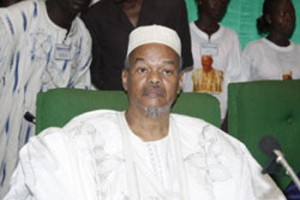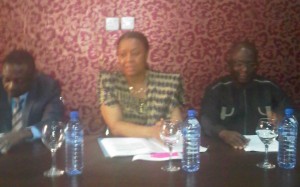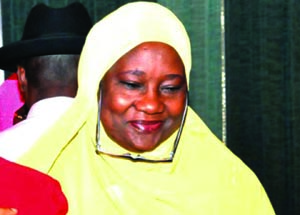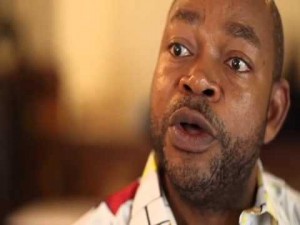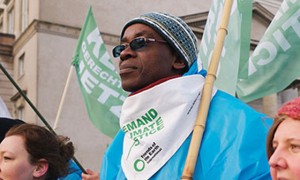On July 10 2011, Lagos experienced a downpour that lasted for over six hours, claiming lives and destroying properties in the bustling city.
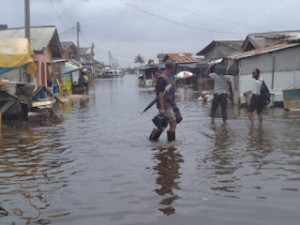
About a year later and several weeks ago, the Atlantic Ocean, swelled by periods of continuous rainfall, surged into neighbouring communities, sacking residents from their homes. The raging flood waters spared no one within its vicinity, including choice residential estates.
Worst hit, however, was Okun Alfa, a waterside community that hosts the popular tourist spot, Alfa Beach, where virtually all the buildings were overrun by the salty ocean water. As was the case in recent times, the flooding left tales of woe in its wake.
A resident, octogenarian Alhaji Alayaki Mudasiru, said that in the over 100 years he has lived at Okun Alfa, the Atlantic Ocean surge never once posed a threat, until the turn of events in recent years.
According to him, the flooding and coastal erosion became noticeable since the commencement of numerous sandfilling and land reclamation activities on and off the Lekki Peninsula coastline. He recalled that the problem started soon after Victoria Island was reclaimed.
He explained that he presently resides in his third home, the two previous ones having been washed away by the Atlantic Ocean which had encroached more than 200 metres inland.
Mudashiru pointed an accusing finger at Chevron Nigeria Limited, which he said acquired a large expanse of land for the construction of an international school and a staff housing estate. He alleged that the fenced landed property impeded water that flowed in the community from finding its way out.
The oil firm had constructed a high-wall fence on the over 10 hectares of land which the residents said that, during the course of sand-filling the land, the existing drainage channel was in the process blocked. They said that they have severally protested to the management of the company to express their displeasure over the blockage of the channel.
Mudashiru’s words: “Whenever the ocean surges and drives us from our houses, we normally moved further away inland and build another house. But now that Chevron has taken over the land, where are we going to move to?”
In an emotion-laden tone, he appealed to the Federal Government to come to their aid by constructing an embankment that would alleviate their plight.
Asked if he would now relocate based on the recent occurrence, he replied: “I have lived all my life at Okun Alfa. I was born and brought up as a farmer. My children living in other parts of Lagos came when they heard about the incident with the intention to take me to their place of abode, but I said no. I will not leave because of that. I will stay her till death comes.”
Narrating his experience, clergyman Musa Philip, who pastors a Pentecostal church in the community, said if the surge had happened at night, the extent of the damage and casualties would have been unprecedented.
He said: “The surge started in the early hours of Sunday morning around 2 am. We started noticing water in our houses and everybody was forced to wake up. By the time the daybreak arrived, it had subsided.
“But when it got to around 11.30 am, the surge started again and this time around in a very strong manner that could carry people away. I and one other person had to rescue a woman with four children thrown to a building wall.”
Philip underlined the need for the Federal Government to urgently construct an embankment to avert future occurrence and protect lives and properties. “Failure to do this could be catastrophic,” he warned.
Councillor representing Ward C in Eti-Osa Local Government Area comprising of Okun Alfa and some other communities, Sheriff Elegushi, bemoaned the activities of Chevron Nigeria Limited that allegedly blocking a major drainage channel in the neighbourhood.
He submitted that the community had in recent past suffered from the effect of ocean surge, pointing out that, last year, the only road leading to the community was washed away and that, up till now, they can only access the community through the beach.
Elegushi lamented that since the incident occurred, no emergency unit or government official deemed it fit to sympathise with them.
The councillor, however, appealed to both the central and state governments to come to the community’s aid by constructing a drainage channel as well as embankment to drain away and shield the community from flood waters.
Elegushi said: “When this incident happened last year, President Goodluck Jonathan came here and promised that, through the Ecological Fund Office, government would assist the community. But, up till now, nothing has been done. The state government too has not done anything.
“The Local Government chairman hired a caterpillar to open the canal so that water trapped in the community can flow away.”
Elegushi added that since the incident happened, many people had fled the community and were yet to return. He bemoaned the development on the community’s socio-economic activities.
Besides Okun Alfa, other communities in the local council said to be prone to the disaster are: Igbara, Maiyegun, Aro, Ologolo, Baruwa and Igbo-Efon, which are all along the Lagos coastline.
Elegushi blamed the incident on the various reclamation projects going on in the city particularly the Eko Atlantic City project where large expanse of land is being reclaimed from the sea, by Victoria Island.
The project has been a source of worry to environmentalists, who allege that a thorough Environmental Impact Assessment (EIA) was not conducted before the project commenced.
So far, the Lagos State Government and Messrs. South Energyx Nigeria Limited (project developer) are yet to make public the project’s EIA.
But the developer is reported to have claimed that the project “is already helping to reverse the environmental damage at the Victoria Island caused by a century of coastal erosion. The imposing new sea wall will shield the city of Lagos, as well as Eko Atlantic City.”
Governor Babatunde Fashola of Lagos State said last April at the state’s Climate Change Summit that the project does not constitute an environmental problem but a blessing to the city.
By Michael Simire & Kayode Aboyeji


